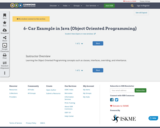
Learning the Object Oriented Programming concepts such as classes, interfaces, overriding, and inheritance.
- Subject:
- Computer Science
- Material Type:
- Full Course
- Author:
- Saeid Samadidana
- Date Added:
- 08/30/2022

Learning the Object Oriented Programming concepts such as classes, interfaces, overriding, and inheritance.
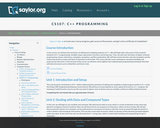
The student will learn the mechanics of editing and compiling a simple program written in C++ beginning with a discussion of the essential elements of C++ programming: variables, loops, expressions, functions, and string class. Next, the student will cover the basics of object-oriented programming: classes, inheritance, templates, exceptions, and file manipulation. The student will then review function and class templates and the classes that perform output and input of characters to/from files. This course will also cover the topics of namespaces, exception handling, and preprocessor directives. In the last part of the course, the student will learn some slightly more sophisticated programming techniques that deal with data structures such as linked lists and binary trees. Upon successful completion of this course, students will be able to: Compile and execute code written in C++ language; Work with the elementary data types and conditional and iteration structures; Define and use functions, pointers, arrays, struct, unions, and enumerations; Write C++ using principles of object-oriented programming; Write templates and manipulate the files; Code and use namespaces, exceptions, and preprocessor instructions; Write a code that represents linked lists and binary trees; Translate simple word problems into C++ language. (Computer Science 107)
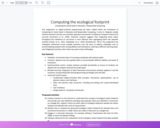
This assignment on object-oriented programming has been crafted within the framework of Computing for Social Good in Education and Responsible Computing. It aims to integrate socially relevant elements into the core activities typically encountered in traditional Computer Science (CS) curricula. Extensive research suggests that integrating these topics throughout the traditional CS curriculum is more effective than segregating them into separate activities. The assignment has undergone refinement across multiple iterations over the years to address challenges such as accommodating students with varying abilities and motivations, catering to different learning styles, and mitigating frustration when tasks may seem overly challenging.
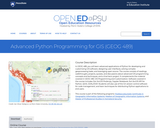
In GEOG 489, you will learn advanced applications of Python for developing and customizing GIS software, designing user interfaces, solving complex geoprocessing tasks, and leveraging open source. The course consists of readings, walkthroughs, projects, quizzes, and discussions about advanced GIS programming concepts and techniques, and a final term project. It complements the material covered in GEOG 485: GIS Programming and Customization. Software covered in the course includes: Esri ArcGIS Pro/arcpy, Jupyter Notebook, Esri ArcGIS API for Python, QGIS, GDAL/OGR. Students will also use of the Git version control software for code management, and learn techniques for distributing Python applications to end users.

This is a fast-paced introductory course to the C++ programming language. It is intended for those with little programming background, though prior programming experience will make it easier, and those with previous experience will still learn C++-specific constructs and concepts.
This course is offered during the Independent Activities Period (IAP), which is a special 4-week term at MIT that runs from the first week of January until the end of the month.

Ever hang your head in shame after your Python program wasn't as fast as your friend's C program? Ever wish you could use objects without having to use Java? Join us for this fun introduction to C and C++! We will take you through a tour that will start with writing simple C programs, go deep into the caves of C memory manipulation, resurface with an introduction to using C++ classes, dive deeper into advanced C++ class use and the C++ Standard Template Libraries. We'll wrap up by teaching you some tricks of the trade that you may need for tech interviews.
We see this as a "C/C++ empowerment" course: we want you to come away understanding
why you would want to use C over another language (control over memory, probably for performance reasons),
why you would want to use C++ rather than C (objects), and
how to be useful in C and C++.
This course is offered during the Independent Activities Period (IAP), which is a special 4-week term at MIT that runs from the first week of January until the end of the month.

This course provides a fast-paced introduction to the C and C++ programming languages. You will learn the required background knowledge, including memory management, pointers, preprocessor macros, object-oriented programming, and how to find bugs when you inevitably use any of those incorrectly. There will be daily assignments and a small-scale individual project.
This course is offered during the Independent Activities Period (IAP), which is a special 4-week term at MIT that runs from the first week of January until the end of the month.

6.0001 Introduction to Computer Science and Programming in Python is intended for students with little or no programming experience. It aims to provide students with an understanding of the role computation can play in solving problems and to help students, regardless of their major, feel justifiably confident of their ability to write small programs that allow them to accomplish useful goals. The class uses the Python 3.5 programming language.

This course provides an integrated introduction to electrical engineering and computer science, taught using substantial laboratory experiments with mobile robots. Our primary goal is for you to learn to appreciate and use the fundamental design principles of modularity and abstraction in a variety of contexts from electrical engineering and computer science.
Our second goal is to show you that making mathematical models of real systems can help in the design and analysis of those systems. Finally, we have the more typical goals of teaching exciting and important basic material from electrical engineering and computer science, including modern software engineering, linear systems analysis, electronic circuits, and decision-making.
Course Format
This course has been designed for independent study. It includes all of the materials you will need to understand the concepts covered in this subject. The materials in this course include:
Lecture videos from Spring 2011, taught by Prof. Dennis Freeman
Recitation videos, developed for OCW Scholar by teaching assistant Kendra Pugh
Course notes
Software and design labs
Homework assignments and additional exercises
Nano-quizzes and exams with solutions
Content Development
Leslie Kaelbling
Jacob White
Harold Abelson
Dennis Freeman
Tomás Lozano-Pérez
Isaac Chuang

This course is an introduction to software engineering, using the Java™ programming language. It covers concepts useful to 6.005. Students will learn the fundamentals of Java. The focus is on developing high quality, working software that solves real problems.
The course is designed for students with some programming experience, but if you have none and are motivated you will do fine. Students who have taken 6.005 should not take this course. Each class is composed of one hour of lecture and one hour of assisted lab work.
This course is offered during the Independent Activities Period (IAP), which is a special 4-week term at MIT that runs from the first week of January until the end of the month.

This course focuses on introducing the language, libraries, tools and concepts of Javaᵀᴹ. The course is specifically targeted at students who intend to take 6.170 in the following term and feel they would struggle because they lack the necessary background. Topics include: Object-oriented programming, primitives, arrays, objects, inheritance, interfaces, polymorphism, hashing, data structures, collections, nested classes, floating point precision, defensive programming, and depth-first search algorithm.

6.821 teaches the principles of functional, imperative, and logic programming languages. Topics covered include: meta-circular interpreters, semantics (operational and denotational), type systems (polymorphism, inference, and abstract types), object oriented programming, modules, and multiprocessing. The course involves substantial programming assignments and problem sets as well as a significant amount of reading. The course uses the Scheme+ programming language for all of its assignments.
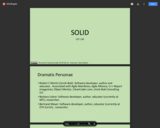
Slide deck that explains SOLID, an acronym for five OOD principles promoted by Robert C.
Martin and used in object-oriented programming to develop better software. Includes examples.